What Are Push Notifications?
Role of Firebase Cloud Messaging (FCM)
Complete Implementation: Flutter + Laravel + FCM + MySQL
What Are Push Notifications?
Push notifications are messages sent from a server to a user’s device even when the app is not actively open. They are commonly used for:
Booking confirmations
Order status updates
Payment / recharge success messages
Reminders and alerts
Key characteristics:
Server-initiated: The server decides when to send.
Delivered via a push service: Google, Apple, etc.
Can wake the app or show messages in the notification tray.
For your use case (Flutter app + Laravel backend + MySQL bookings), push notifications are ideal for:
“Booking created successfully”
“Booking approved / vehicle ready”
“Booking cancelled”
Role of Firebase Cloud Messaging (FCM)
Firebase Cloud Messaging (FCM) is Google’s push notification service.
FCM’s responsibilities:
Generate device tokens
Each device/app installation gets a unique fcm_token.
You send this token to your backend (Laravel).
Deliver messages from your server to devices
Laravel sends a POST request to FCM with:
Target token(s)
Notification title + body
Optional data (e.g., booking_id)
Handle different app states
App in foreground: You can show a custom in-app notification.
Background / killed: System tray notification appears.
In your architecture:
Flutter app:
Gets FCM token and sends it to Laravel API.
Laravel backend (with MySQL):
Stores token in device_tokens table.
When createBooking() is called and booking is saved, it:
Looks up the user’s token(s).
Sends a request to FCM.
FCM delivers the push notification to the device.
Complete Implementation: Flutter + Laravel + FCM + MySQL
Laravel Setup
STEP 1 — Prerequisite (Service Account JSON)
Place your downloaded JSON here:
C:\myworkspace\motoshare-web\storage\fcm-service-account.json
✅ STEP 2 — Add in .env
FIREBASE_CREDENTIALS=storage/app/fcm-service-account.json
FIREBASE_PROJECT_ID=your-project-id
==============OR============================
FIREBASE_CREDENTIALS=fcm-service-account.json
FIREBASE_PROJECT_ID=motoshare-2f51c
Find your project ID in Firebase console.
Migration: device_tokens table
php artisan make:migration create_device_tokens_table
database/migrations/xxxx_xx_xx_create_device_tokens_table.php:
<?php
use Illuminate\Database\Migrations\Migration;
use Illuminate\Database\Schema\Blueprint;
use Illuminate\Support\Facades\Schema;
return new class extends Migration {
public function up(): void
{
Schema::create('device_tokens', function (Blueprint $table) {
$table->id();
$table->unsignedBigInteger('user_id');
$table->string('fcm_token')->nullable();
$table->timestamps();
});
}
/**
* Reverse the migrations.
*/
public function down(): void
{
Schema::dropIfExists('device_tokens');
}
};
Run:
php artisan migrate
Model: DeviceToken
php artisan make:model DeviceToken
app/Models/DeviceToken.php:
<?php
namespace App\Models;
use Illuminate\Database\Eloquent\Model;
class DeviceToken extends Model
{
protected $fillable = [
'user_id',
'fcm_token',
];
}
Controller: Save FCM Token from Flutter
Route in routes/api.php:
use App\Http\Controllers\DeviceTokenController;
Route::post('/device-token', [DeviceTokenController::class, 'store']);
Controller app/Http/Controllers/DeviceTokenController.php:
<?php
namespace App\Http\Controllers;
use App\Models\DeviceToken;
use Illuminate\Http\Request;
class DeviceTokenController extends Controller
{
public function store(Request $request)
{
$data = $request->validate([
'user_id' => 'required|integer',
'fcm_token' => 'required|string',
]);
DeviceToken::updateOrCreate(
['user_id' => $data['user_id']],
['fcm_token' => $data['fcm_token']]
);
return response()->json([
'success' => true,
'message' => 'FCM token saved',
]);
}
}
==============================OR=========================
public function get_tokenbyemail(Request $request)
{
// 1) Validate input
Log::info('get_tokenbyemail data:', $request->all());
$data = $request->validate([
'email' => 'required|email',
'token' => 'required|string',
]);
// 2) Find user by email
$user = User::where('email', $data['email'])->first();
if (!$user) {
return response()->json([
'success' => false,
'message' => 'User not found for given email',
], 404);
}
// 3) Save / update FCM token in device_tokens table
$deviceToken = DeviceToken::updateOrCreate(
['user_id' => $user->id], // search by user_id
['fcm_token' => $data['token']] // update this field
);
// 4) Return JSON response
return response()->json([
'success' => true,
'message' => 'FCM token saved',
'data' => [
'user_id' => $user->id,
'device_token_id' => $deviceToken->id,
'fcm_token' => $deviceToken->fcm_token,
],
]);
}
public function get_tokenbyphone(Request $request)
{
// 1) Validate input
Log::info('get_tokenbyphone data:', $request->all());
$data = $request->validate([
'phone' => 'required|string',
'token' => 'required|string',
]);
// 2) Find user by phone number
$user = User::where('number', $data['phone'])->first();
if (!$user) {
return response()->json([
'success' => false,
'message' => 'User not found for given phone number',
], 404);
}
// 3) Save or update FCM token for this user
$deviceToken = DeviceToken::updateOrCreate(
['user_id' => $user->id], // Search by user_id
['fcm_token' => $data['token']] // Update fcm_token field
);
// 4) Return response
return response()->json([
'success' => true,
'message' => 'FCM token saved successfully',
'data' => [
'user_id' => $user->id,
'device_token_id' => $deviceToken->id,
'fcm_token' => $deviceToken->fcm_token,
]
]);
}
FCM Service: app/Services/FcmService.php
Create the file manually:
<?php
namespace App\Services;
use Google\Client;
use Illuminate\Support\Facades\Log;
use Illuminate\Support\Facades\Http;
class FcmService
{
/**
* Send push notification using FCM HTTP v1 API
*/
public function sendToToken(string $token, string $title, string $body, array $data = []): bool
{
try {
$credRelative = env('FIREBASE_CREDENTIALS', 'fcm-service-account.json');
$credPath = storage_path($credRelative);
Log::info('[FCM V1] Using credentials path', ['path' => $credPath]);
if (!is_file($credPath)) {
Log::error('[FCM V1] Firebase credentials file not found or not a file', [
'path' => $credPath,
]);
return false;
}
$client = new Client();
$client->setAuthConfig($credPath);
$client->addScope('https://www.googleapis.com/auth/firebase.messaging');
$googleToken = $client->fetchAccessTokenWithAssertion();
$accessToken = $googleToken['access_token'] ?? null;
if (!$accessToken) {
Log::error("[FCM V1] Failed to fetch access token", $googleToken);
return false;
}
// 🔹 Sanitize data: ALL values must be STRING for FCM
$cleanData = [];
foreach ($data as $key => $value) {
if (is_bool($value)) {
$cleanData[$key] = $value ? '1' : '0';
} elseif (is_scalar($value)) { // int, float, string
$cleanData[$key] = (string) $value;
} else {
// arrays/objects → JSON string
$cleanData[$key] = json_encode($value);
}
}
$payload = [
'message' => [
'token' => $token,
'notification' => [
'title' => $title,
'body' => $body,
],
'data' => $cleanData,
],
];
$projectId = env('FIREBASE_PROJECT_ID');
$response = Http::withToken($accessToken)
->post("https://fcm.googleapis.com/v1/projects/{$projectId}/messages:send", $payload);
if ($response->failed()) {
Log::error("[FCM V1] Send Failed", [
'token' => $token,
'payload' => $payload, // helpful for debugging
'response' => $response->body(),
]);
return false;
}
Log::info("[FCM V1] Push Sent Successfully", [
'token' => $token,
'response' => $response->body(),
]);
return true;
} catch (\Throwable $e) {
Log::error("[FCM V1] Exception", [
'error' => $e->getMessage(),
]);
return false;
}
}
}
Integrate FCM into your existing createBooking() method
You shared this method earlier. We’ll just add FCM sending at the end.
At top of the file where createBooking lives:
use App\Models\DeviceToken;
use App\Services\FcmService;
use Illuminate\Support\Facades\Log;
Inject FcmService into the class:
protected FcmService $fcm;
public function __construct(FcmService $fcm)
{
$this->fcm = $fcm;
}
=============================OR==============
class UtilityFunctionsController extends Controller
{
protected $accessToken;
protected $phoneNumberId;
protected $version;
protected $url;
protected FcmService $fcm;
public function __construct(FcmService $fcm)
{
// Inject FCM Service
$this->fcm = $fcm;
// Keep existing WhatsApp initialization
$this->accessToken = env('WHATSAPP_ACCESS_TOKEN');
$this->phoneNumberId = env('WHATSAPP_PHONE_NUMBER_ID');
$this->version = 'v20.0';
$this->url = "https://graph.facebook.com/{$this->version}/{$this->phoneNumberId}/messages";
}
Now your updated createBooking():
public function createBooking($request, $getphone, $getvehicle)
{
$booking = null; // Default to null in case no booking gets created
$endDate = new DateTime($request->end_date);
$endDate->modify('-1 day');
// Get shop details to set destination
$shop_id = $getvehicle->shop_id;
$getshop = Shop::where('id', $shop_id)->first();
$destination = $getshop->partner_name; // Corrected to use shop's partner name as destination
$vehicleImage = $getvehicle->vechicle_image;
$img = json_decode($vehicleImage, true);
$payment_type=$getvehicle->payment_type;
$vehicleprice=$getvehicle->price;
$vendor = User::where('id', $getvehicle->vender_ID)->first();
$shop = shop::where('id', $getvehicle->shop_id)->first();
$vehicle_id = $request->has('vehicle_id') ? $request->vehicle_id : $request->vechicle_id;
// Create booking in the database
$isDuplicate = Booking::where('user_id', $getphone->id)
->where('vechicle_id', $vehicle_id)
->where('start_date', $request->start_date)
->where('end_date', $endDate->format('Y-m-d'))
->whereIn('status', [0, 1, 2, 3, 4])
->exists();
log::info("inside createbooking");
log::info($isDuplicate);
if (!$isDuplicate) {
$booking = Booking::create([
'user_name' => $getphone->name,
'destination' => $destination, // Use destination from shop model
'vechicle_type' => $getvehicle->vechicle,
'brand' => $getvehicle->brand,
'model' => $getvehicle->model,
'price' => $this->calculateBookingPrice(
$request->start_date,
$request->end_date,
$vehicleprice // make sure this is per-day price from your DB/model
),
'start_date' => $request->start_date,
'end_date' => $endDate->format('Y-m-d'),
'number' => $getphone->number,
'myvechical_id' => $getvehicle->vehical_id,
'email' => $getphone->email,
'user_id' => $getphone->id,
'vender_id' => $getvehicle->vender_ID,
'vechicle_id' => $vehicle_id,
'vechicle_image' => json_encode($img),
'shop_id' => $getvehicle->shop_id,
'status' => ($payment_type == 1) ? '0' : '3',
'state' => ($payment_type == 1) ? 'Pending' : 'Vehicle Ready',
]);
// Send email notifications to user, vendor, and admin
// Send WhatsApp notification to user
$this->sendWhatsappMessage(
$getphone, $getvehicle, $request->total_price, $getvehicle->vechicle,
$getvehicle->brand, $getvehicle->model, $getshop->partner_name,
$request->start_date, $endDate, null, $template=1
);
}
$this->sendEmails(
$getphone, // User model (user details)
$vendor, // Vendor model (vendor details)
$booking, // Booking model (booking details)
$getvehicle, // Vehicle model (vehicle details)
$shop, // Shop model (shop details)
$request, // Request data (includes total_price, start_date, end_date)
$payment_type // Payment type (for status logic)
);
$this->removeDuplicateBookings();
log::info($getphone->id);
$startDateStr = $request->start_date;
$endDateStr = $endDate->format('Y-m-d');
$title = 'Booking Created Successfully';
$body = "Hi {$getphone->name}, your booking #{$booking->id} "
. "for {$getvehicle->brand} {$getvehicle->model} "
. "from {$startDateStr} to {$endDateStr} is created.";
$this->sendBookingNotification(
$getphone, // user
$booking, // booking model
$getvehicle, // vehicle
$getshop, // shop
$title, // title
$body, // body
'booking_created' // type
); // Return success response
$bodys = "Hi {$vendor->name}, your booking #{$booking->id} "
. "for {$getvehicle->brand} {$getvehicle->model} "
. "from {$startDateStr} to {$endDateStr} is created.";
$this->sendBookingNotification(
$vendor, // user
$booking, // booking model
$getvehicle, // vehicle
$getshop, // shop
$title, // title
$bodys, // body
'booking_created' // type
);
return $booking;
}
==================================================================
private function sendBookingNotification($getphone, $booking, $getvehicle, $getshop, $title, $body, $type)
{
Log::info("[FCM] Notification triggered for user: {$getphone->id}");
$tokens = DeviceToken::where('user_id', $getphone->id)->pluck('fcm_token')->all();
if (empty($tokens)) {
Log::warning('[FCM] No device tokens for user', ['user_id' => $getphone->id]);
return;
}
foreach ($tokens as $token) {
$this->fcm->sendToToken($token, $title, $body, [
'type' => $type,
'booking_id' => $booking->id,
'price' => $booking->price,
'state' => $booking->state,
'vehicle' => $getvehicle->vechicle,
'brand' => $getvehicle->brand,
'model' => $getvehicle->model,
'shop_name' => $getshop->partner_name,
]);
}
}
Flutter Setup
Add dependencies (pubspec.yaml)
buildscript {
repositories {
google()
mavenCentral()
}
dependencies {
classpath 'com.google.gms:google-services:4.4.2'
}
}
STEP 2 — Add plugin inside app/build.gradle
android/app/build.gradle
dependencies:
flutter:
sdk: flutter
app_settings: ^6.1.1
firebase_core: ^4.2.1
firebase_messaging: ^16.0.4
flutter_local_notifications: ^19.5.0
http: ^1.2.2
AndroidManifest.xml
R:\firebase\firebase\android\app\src\main\AndroidManifest.xml
<meta-data
android:name="com.google.firebase.messaging.default_notification_channel_id"
android:value="high_importance_channel" />
STEP 3 — Add Firebase BoM + Firebase Messaging
Inside your dependencies block:
dependencies {
implementation platform('com.google.firebase:firebase-bom:34.5.0')
implementation 'com.google.firebase:firebase-messaging'
implementation 'com.google.firebase:firebase-analytics'
// Your existing dependencies
implementation 'javax.annotation:javax.annotation-api:1.3.2'
implementation 'com.google.errorprone:error_prone_annotations:2.15.0'
implementation 'com.google.crypto.tink:tink-android:1.9.0'
implementation 'androidx.multidex:multidex:2.0.1'
}
Run:
flutter pub get
Local Notification Service (for foreground notifications)
Create file: lib/local_notification_service.dart
import 'package:flutter/material.dart';
import 'package:flutter_local_notifications/flutter_local_notifications.dart';
import 'package:firebase_messaging/firebase_messaging.dart';
import 'package:app_settings/app_settings.dart';
import 'package:motoshare/main.dart';
import 'package:motoshare/screens/drawer_widget/messagescreen.dart';
import 'package:motoshare/screens/drawer_widget/all_notifications_page.dart';
import 'package:motoshare/screens/login.dart';
import 'package:motoshare/screens/login_screen.dart';
import 'package:motoshare/view_modal/Login_view_model.dart';
import 'package:provider/provider.dart';
import 'package:shared_preferences/shared_preferences.dart';
class NotificationServices {
final FirebaseMessaging _messaging = FirebaseMessaging.instance;
final FlutterLocalNotificationsPlugin _flutterLocalNotificationsPlugin =
FlutterLocalNotificationsPlugin();
// -----------------------------
// 1) Request permission
// -----------------------------
Future<void> requestNotificationPermission() async {
NotificationSettings settings = await _messaging.requestPermission(
alert: true,
announcement: true,
badge: true,
carPlay: false,
criticalAlert: true,
provisional: true,
sound: true,
);
if (settings.authorizationStatus == AuthorizationStatus.authorized) {
print("User granted permission");
} else if (settings.authorizationStatus ==
AuthorizationStatus.provisional) {
print("User granted provisional permission");
} else {
print("User denied notification permission");
AppSettings.openAppSettings();
}
}
// -----------------------------
// 2) Token + refresh
// -----------------------------
Future<String?> getDeviceToken() async {
String? token = await _messaging.getToken();
print("FCM my Token: $token");
return token;
}
void monitorTokenRefresh(Function(String) onNewToken) {
FirebaseMessaging.instance.onTokenRefresh.listen((newToken) async {
print("🔄 FCM AUTO-REFRESHED TOKEN");
print("New Token: $newToken");
// Callback to save + send to backend
onNewToken(newToken);
});
}
// -----------------------------
// 3) Init local notifications
// (CALL ONLY ON MAIN ISOLATE)
// -----------------------------
Future<void> initLocalNotifications() async {
const AndroidInitializationSettings androidInitializationSettings =
AndroidInitializationSettings('@mipmap/ic_launcher');
const DarwinInitializationSettings iosInitializationSettings =
DarwinInitializationSettings();
const InitializationSettings initializationSettings =
InitializationSettings(
android: androidInitializationSettings,
iOS: iosInitializationSettings,
);
await _flutterLocalNotificationsPlugin.initialize(
initializationSettings,
onDidReceiveNotificationResponse: (response) {
String? bookingId = response.payload;
print("📲 LOCAL notification tapped with payload: $bookingId");
if (bookingId != null) {
_navigateFromTopBar(bookingId);
}
},
);
// NOTE: channel id must match showNotification()
const AndroidNotificationChannel channel = AndroidNotificationChannel(
'high_importance_channel',
'High Importance Notifications',
description: 'Channel for important notifications',
importance: Importance.max,
);
await _flutterLocalNotificationsPlugin
.resolvePlatformSpecificImplementation<
AndroidFlutterLocalNotificationsPlugin>()
?.createNotificationChannel(channel);
}
// -----------------------------
// 4) Foreground messages
// -----------------------------
void firebaseInit() {
FirebaseMessaging.onMessage.listen((message) {
print("FG data: ${message.data}");
showNotification(message);
// if (message.data['type'] == 'booking_created') {
// final bookingId = message.data['booking_id'];
// final ctx = navigatorKey.currentContext;
// if (ctx == null) return;
// showDialog(
// context: ctx,
// builder: (_) => AlertDialog(
// title: Text("Booking Created"),
// content: Text("Tap to open booking details."),
// actions: [
// TextButton(
// child: Text("Open"),
// onPressed: () {
// Navigator.pop(ctx);
// Navigator.push(
// ctx,
// MaterialPageRoute(
// builder: (_) => AllVehicle(),
// ),
// );
// },
// )
// ],
// ),
// );
// }
});
}
void _navigateFromTopBar(String bookingId) {
final ctx = navigatorKey.currentContext;
if (ctx == null) {
print("❌ No context for navigation");
return;
}
Navigator.push(
ctx,
MaterialPageRoute(
builder: (_) => AllNotificationsPage(),
),
);
}
void handleMessage(BuildContext context, RemoteMessage message) {
if (!context.mounted) return;
if (message.data['type'] == 'booking_created') {
final bookingId = message.data['booking_id']; // FIXED KEY
if (bookingId == null) {
print("❌ booking_id is missing in message.data");
return;
}
print("Navigating to booking screen with ID: $bookingId");
Navigator.push(
context,
MaterialPageRoute(
builder: (_) => MessageScreen(id: bookingId),
),
);
}
}
// -----------------------------
// 5) Local notification display
// -----------------------------
Future<void> showNotification(RemoteMessage message) async {
const AndroidNotificationDetails androidNotificationDetails =
AndroidNotificationDetails(
'high_importance_channel', // ✅ SAME as in channel
'High Importance Notifications',
channelDescription: 'Channel for important notifications',
importance: Importance.high,
priority: Priority.high,
icon: '@mipmap/ic_launcher',
);
const DarwinNotificationDetails darwinNotificationDetails =
DarwinNotificationDetails(
presentAlert: true,
presentBadge: true,
presentSound: true,
);
const NotificationDetails notificationDetails = NotificationDetails(
android: androidNotificationDetails,
iOS: darwinNotificationDetails,
);
await _flutterLocalNotificationsPlugin.show(
0,
message.notification?.title ?? 'Notification',
message.notification?.body ?? '',
notificationDetails,
payload: message.data['booking_id'],
);
}
// -----------------------------
// 6) Background / resumed click
// -----------------------------
void handleNotificationClick() {
// App opened from background (notification tap)
FirebaseMessaging.onMessageOpenedApp.listen((RemoteMessage message) {
print("📲 Notification clicked (Background)");
_handleNavigation(message);
});
}
Future<void> handleInitialMessage() async {
// App opened from terminated state by tapping notification
RemoteMessage? message = await FirebaseMessaging.instance.getInitialMessage();
if (message != null) {
print("🚀 App opened from terminated via notification");
_handleNavigation(message);
}
}
void _handleNavigation(RemoteMessage message) async {
final bookingId = message.data['booking_id'];
if (bookingId == null) {
print("❌ booking_id missing in notification click!");
return;
}
final ctx = navigatorKey.currentContext;
if (ctx == null) {
print("❌ navigatorKey context is null");
return;
}
// -------------------------
// CHECK LOGIN STATUS
// -------------------------
final prefs = await SharedPreferences.getInstance();
final email = prefs.getString('email');
bool isLoggedIn = email != null && email.trim().isNotEmpty;
if (isLoggedIn) {
// USER LOGGED IN → Redirect to Notifications
Navigator.push(
ctx,
MaterialPageRoute(builder: (_) => const AllNotificationsPage()),
);
} else {
Navigator.push(
ctx,
MaterialPageRoute(
builder: (context) {
final loginViewModel = Provider.of<LoginViewModel>(context, listen: false);
return LoginScreen(loginViewModel: loginViewModel);
},
),
);
}
}
}
class NotificationClickScreen extends StatelessWidget {
final String title;
final String body;
const NotificationClickScreen({
super.key,
required this.title,
required this.body,
});
@override
Widget build(BuildContext context) {
return Scaffold(
appBar: AppBar(title: const Text("Notification Details")),
body: Padding(
padding: const EdgeInsets.all(16),
child: Column(
crossAxisAlignment: CrossAxisAlignment.start,
children: [
Text(
"Title: $title",
style: const TextStyle(
fontSize: 20,
fontWeight: FontWeight.bold,
),
),
const SizedBox(height: 10),
Text(
"Body: $body",
style: const TextStyle(fontSize: 18),
),
],
),
),
);
}
}
Firebase API Wrapper (get token, send to Laravel, handle foreground + background)
In motoshare view model
Future<List<DeviceToken>> gettokenbyemail(String email,String token) async {
var url = "$baseUrl/api/get_tokenbyemail";
// Create the request body including the additional parameters
var body = jsonEncode({
"email": email, // Email of the user
"token": token, // Email of the user
});
print("Request fetchProjects: $url");
print("Request fetchProjects: $body");
// Send the POST request to the API
final response = await http.post(
Uri.parse(url),
headers: {
"Content-Type": "application/json", // Set content type as JSON
},
body: body,
);
print("Response Status getshopname: ${response.statusCode}");
print("Response Body getshopname: ${response.body}");
// Check if the response status is OK (200)
if (response.statusCode == 200) {
// Parse the response body to a Map<String, dynamic>
Map<String, dynamic> responseData = jsonDecode(response.body);
// Extract the 'data' field
var vehicleData = responseData['data'];
return vehicleData.map((data) => DeviceToken.fromJson(data)).toList();
} else {
throw Exception("Failed to fetch projects data");
}
}
Future<List<DeviceToken>> gettokenbyphone(String phone,String token) async {
var url = "$baseUrl/api/get_tokenbyphone";
// Create the request body including the additional parameters
var body = jsonEncode({
"phone": phone, // Email of the user
"token": token, // Email of the user
});
print("Request fetchProjects: $url");
print("Request fetchProjects: $body");
// Send the POST request to the API
final response = await http.post(
Uri.parse(url),
headers: {
"Content-Type": "application/json", // Set content type as JSON
},
body: body,
);
print("Response Status getshopname: ${response.statusCode}");
print("Response Body getshopname: ${response.body}");
// Check if the response status is OK (200)
if (response.statusCode == 200) {
// Parse the response body to a Map<String, dynamic>
Map<String, dynamic> responseData = jsonDecode(response.body);
// Extract the 'data' field
var vehicleData = responseData['data'];
return vehicleData.map((data) => DeviceToken.fromJson(data)).toList();
} else {
throw Exception("Failed to fetch projects data");
}
}
main.dart – Initialize Firebase, background handler, and start FCM
Create / update lib/main.dart:
import 'package:flutter/material.dart';
import 'package:motoshare/screens/drawer_widget/decider.dart';
import 'package:provider/provider.dart';
import 'package:shared_preferences/shared_preferences.dart';
import 'package:motoshare/screens/countryselectionpage.dart';
import 'package:motoshare/services/motoshare_service.dart';
import 'package:motoshare/view_modal/country_view_model.dart';
import 'package:motoshare/view_modal/Login_view_model.dart';
import 'package:motoshare/view_modal/motoshare_view_model.dart';
import 'package:flutter_dotenv/flutter_dotenv.dart';
import 'package:firebase_messaging/firebase_messaging.dart';
import 'package:firebase_core/firebase_core.dart';
import 'package:app_settings/app_settings.dart';
import 'package:motoshare/services/notification_services.dart';
final GlobalKey<NavigatorState> navigatorKey = GlobalKey<NavigatorState>();
void main() async {
WidgetsFlutterBinding.ensureInitialized();
await Firebase.initializeApp();
// 2) Background handler
FirebaseMessaging.onBackgroundMessage(_firebaseMessagingBackgroundHandler);
await dotenv.load(fileName: ".env");
final prefs = await SharedPreferences.getInstance();
// Fetch the saved baseUrl from SharedPreferences
String initialBaseUrl = prefs.getString('baseUrl') ?? 'https://motoshare.in'; // Default URL
runApp(DynamicAppWrapper(initialBaseUrl: initialBaseUrl));
}
@pragma('vm:entry-point')
Future<void> _firebaseMessagingBackgroundHandler(RemoteMessage message) async {
await Firebase.initializeApp();
print(message.notification!.title.toString());
}
====================OR===========================
In decider.dart file
import 'package:firebase_messaging/firebase_messaging.dart';
import 'package:flutter/material.dart';
import 'package:motoshare/screens/countryselectionpage.dart';
import 'package:motoshare/screens/drawer_widget/allvehicle.dart';
import 'package:provider/provider.dart';
import 'dart:async';
import 'package:shared_preferences/shared_preferences.dart';
import 'package:motoshare/services/notification_services.dart';
import 'package:motoshare/view_modal/motoshare_view_model.dart';
class DeciderPage extends StatefulWidget {
const DeciderPage({super.key});
@override
State<DeciderPage> createState() => _DeciderPageState();
}
class _DeciderPageState extends State<DeciderPage> {
final NotificationServices _notificationServices = NotificationServices();
@override
void initState() {
super.initState();
_initNotificationsAndSendToken();
}
Future<void> _initNotificationsAndSendToken() async {
// 1) Token Refresh Listener
_notificationServices.monitorTokenRefresh((newToken) async {
final prefs = await SharedPreferences.getInstance();
await prefs.setString('fcm_token', newToken);
final savedPhone = prefs.getString('phone');
final savedEmail = prefs.getString('email');
if (savedPhone != null && savedPhone.isNotEmpty) {
await _sendTokenToBackendByPhone(savedPhone, newToken);
} else if (savedEmail != null && savedEmail.isNotEmpty) {
await _sendTokenToBackendByEmail(savedEmail, newToken);
}
});
// 2) Ask permission
await _notificationServices.requestNotificationPermission();
// 3) Get and save token
final token = await _notificationServices.getDeviceToken();
final prefs = await SharedPreferences.getInstance();
await prefs.setString('fcm_token', token ?? "");
// 4) Send token to backend
final savedPhone = prefs.getString('phone');
final savedEmail = prefs.getString('email');
if (savedPhone != null && savedPhone.isNotEmpty) {
await _sendTokenToBackendByPhone(savedPhone, token.toString());
} else if (savedEmail != null && savedEmail.isNotEmpty) {
await _sendTokenToBackendByEmail(savedEmail, token.toString());
}
// 5) Initialize FCM handlers
WidgetsBinding.instance.addPostFrameCallback((_) async {
await _notificationServices.initLocalNotifications();
_notificationServices.firebaseInit(); // Foreground
_notificationServices.handleNotificationClick(); // Background click
_notificationServices.handleInitialMessage(); // Terminated click
});
// 6) Navigate
_navigate();
}
Future<void> _sendTokenToBackendByEmail(String email, String token) async {
// exactly like your getmyprofile pattern
final profileViewModel =
Provider.of<MotoshareViewModel>(context, listen: false);
try {
await profileViewModel.sendFcmTokenByEmail(email,token);
print("✅ FCM token sent to backend using email");
} catch (e) {
print("❌ Error sending FCM token by email: $e");
}
}
Future<void> _sendTokenToBackendByPhone(String phone, String token) async {
final profileViewModel =
Provider.of<MotoshareViewModel>(context, listen: false);
try {
await profileViewModel.sendFcmTokenByPhone(phone,token);
print("✅ FCM token sent to backend using phone");
} catch (e) {
print("❌ Error sending FCM token by phone: $e");
}
}
=============== OR in motoshare.partner=========================
In C:\Project\motoshare\lib\screens\drawer_widget\allvehicle.dart
Future<void> _fetchData() async {
setState(() {
_isLoading = true;
});
try {
final motoshareViewModel =Provider.of<MotoshareViewModel>(context, listen: false);
await motoshareViewModel.getVehicleData();
final prefs = await SharedPreferences.getInstance();
String baseUrls = prefs.getString('baseUrl') ?? 'https://motoshare.in'; // Default URL
String currencySymbols = prefs.getString('currency_symbol')?? 'Rs'; // Default URL
String countrynames = prefs.getString('countryname')?? 'Rs'; // Default URL
print("mycountryname is there");
print(countrynames);
// Load baseUrl (fallback to motosshare.in)
// Read stored email
final email = prefs.getString('email');
// Check email not null & not empty
if (email != null && email.trim().isNotEmpty) {
// Read FCM token
final fcmToken = prefs.getString('fcm_token');
print("Stored FCM Token: $fcmToken");
if (fcmToken != null && fcmToken.trim().isNotEmpty) {
// Call backend API
await _sendTokenToBackendByEmail(email, fcmToken);
print("Token sent to backend successfully");
} else {
print("⚠ No FCM token found in SharedPreferences");
}
} else {
print("⚠ Email is NULL or EMPTY — cannot send token");
}
===================================================================
Future _sendTokenToBackendByEmail(String email, String token) async {
// exactly like your getmyprofile pattern
final profileViewModel =
Provider.of(context, listen: false);
try {
await profileViewModel.sendFcmTokenByEmail(email,token);
print("✅ FCM token sent to backend using email");
} catch (e) {
print("❌ Error sending FCM token by email: $e");
}
}
C:\Project\motoshare\lib\screens\login.dart
main.dart
└─ main()
└─ LocalNotificationService.initialize()
local_notification_service.dart
└─ initialize()
Your Login/Home Screen
└─ FirebaseApi.initNotifications()
firebase_api.dart
└─ initNotifications()
└─ onMessage.listen()
└─ LocalNotificationService.showNotification()
local_notification_service.dart
└─ showNotification()
└─ notificationsPlugin.show() → (Notification appears)
Troubleshooting steps
minSdk = 23
C:\Project\motoshare\android\settings.gradle
Look for something like:
plugins {
id "dev.flutter.flutter-plugin-loader" version "1.0.0" apply false
id "com.android.application" version "8.1.0" apply false
id "org.jetbrains.kotlin.android" version "1.8.0" apply false // 👈 here
}
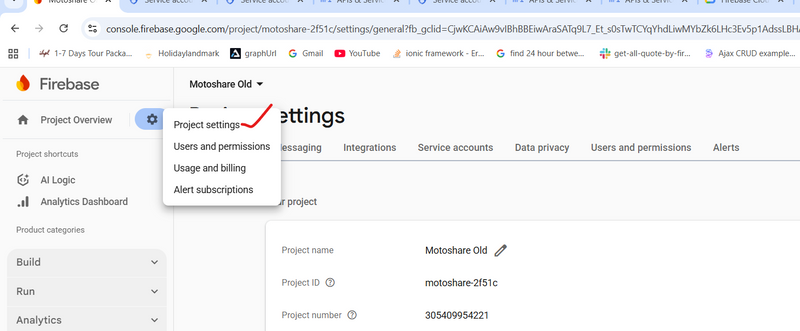


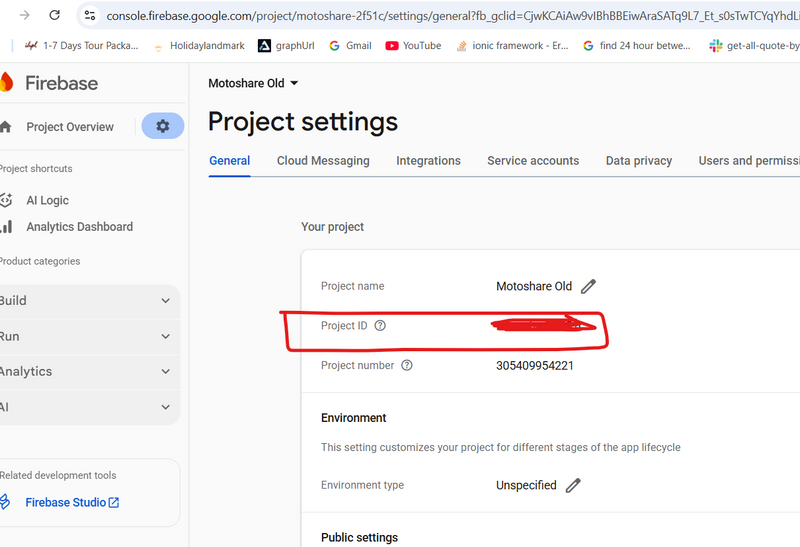
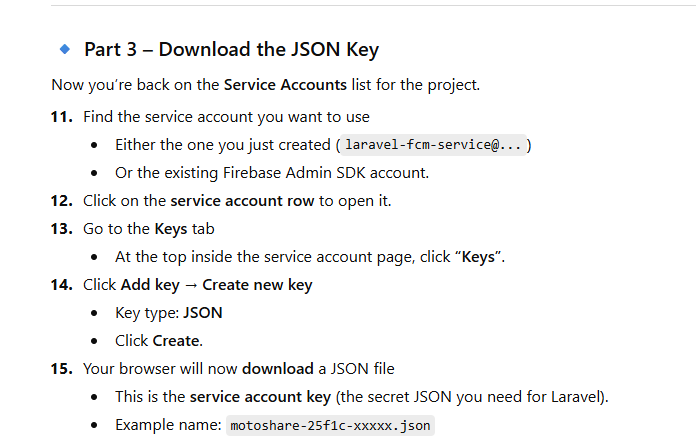

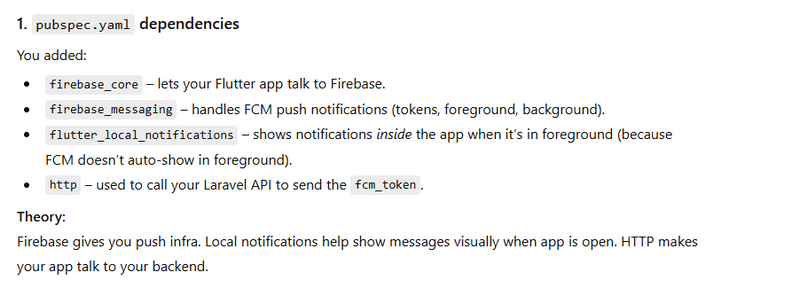

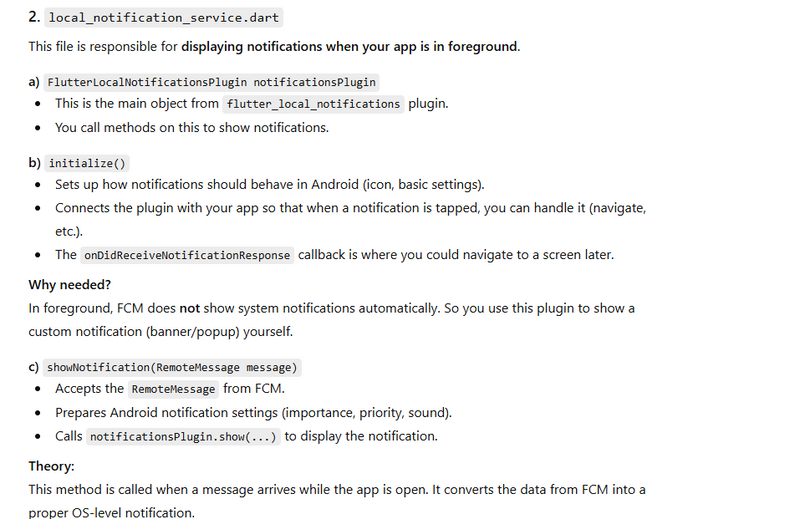
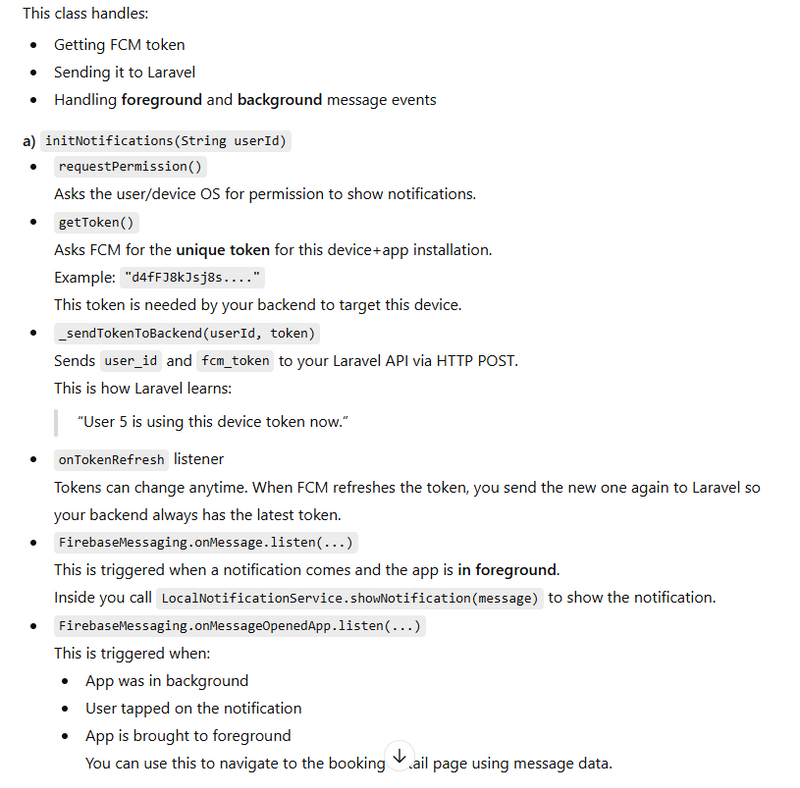

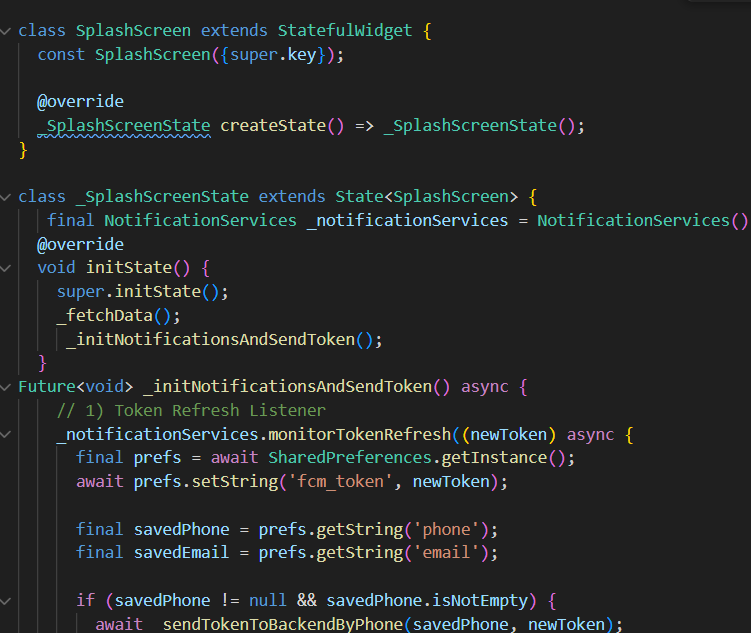
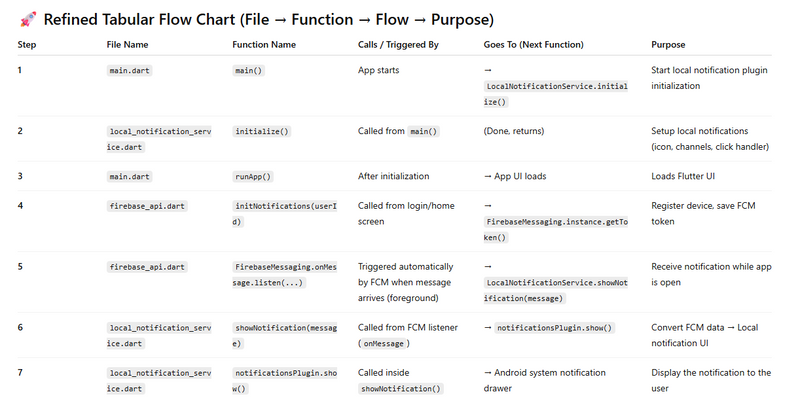

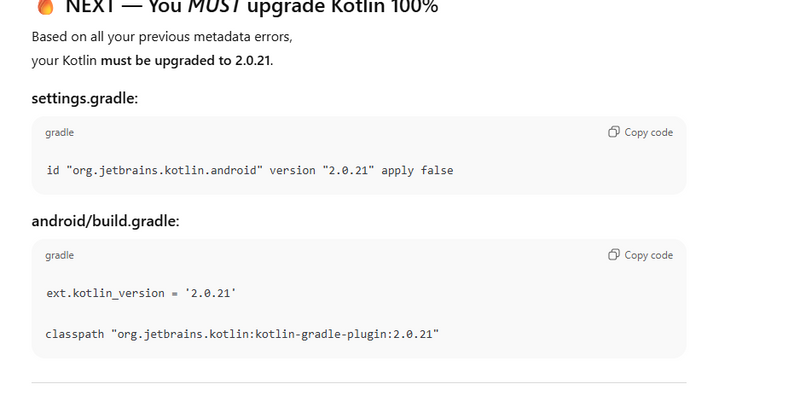

Top comments (0)